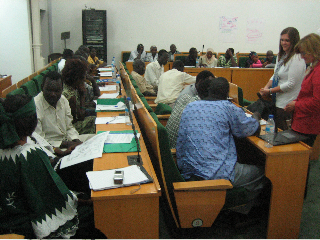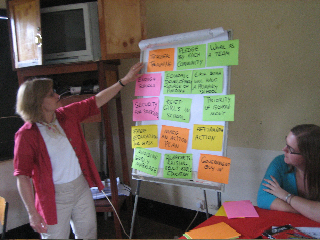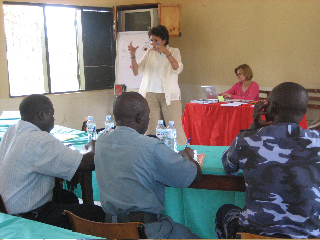In March and April 2009, the ETC-I/CAP team brought the electoral violence prevention (EVP) program to South Sudan. In Juba, the participants included up to ten members of the South Sudan parliament, leaders of youth and women’s organizations, journalist and political party representatives. Participants in Yei were local clergy, civil society organizers, police and security services, and even a local chief.
March 30 – April 1, 2009 - Juba

In March, the ETC-I/CAP team brought the electoral violence prevention (EVP) program to South Sudan. In Juba, the participants included up to ten members of the South Sudan parliament, leaders of youth and women’s organizations, journalist and political party In March, Senior Program Officers Linda Bishai and Jacki Wilson, along with Senior Program Assistant Kelly Campbell of CAP, brought the electoral violence prevention (EVP) program to representatives. Archbishop Paulino of Juba also attended and expressed his approval of the workshop content and desire to have this information spread among members of the clergy. On the first evening, workshop participants were invited to a group dinner at a local restaurant to facilitate a spirit of collegiality and togetherness in learning. They returned the next day eager to work on democratic principles, problem solving and election case studies. Although coordination of the Juba EVP was challenging because of last minute schedule changes, the high level of interest shown in the workshop reflects the serious concerns that many in the South have that the elections occur peacefully.
 April 2-4, 2009 - Yei
April 2-4, 2009 - Yei
Following the Juba EVP program, USIP staff traveled directly to Yei - a 100-mile four-hour journey by extremely poor road. Participants in Yei were local clergy, civil society organizers, police and security services, and even a local chief. They were very committed to working towards peaceful elections but also expressed feelings of disconnectedness from the Southern capital, Juba, and concern at the lack of awareness about electoral issues. The police and security service members were active dedicated participants and were particularly interested in learning more about election violence; they expressed a desire to be included in any future programs on this subject.  Participants also expressed an interest in the Institute’s online courses and one of the Following the Juba EVP program, USIP staff traveled directly to Yei - a 100-mile four-hour journey by extremely poor road. Participants in Yei were local participants from Yei has already earned a certificate for the Conflict Analysis course.
Participants also expressed an interest in the Institute’s online courses and one of the Following the Juba EVP program, USIP staff traveled directly to Yei - a 100-mile four-hour journey by extremely poor road. Participants in Yei were local participants from Yei has already earned a certificate for the Conflict Analysis course.



